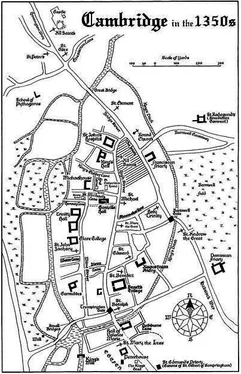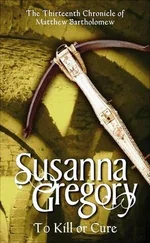‘Are you sure?’ asked Kenyngham, surprised. ‘We have never had jugglers before.’
‘Jugglers, singers and dancers,’ elaborated Suttone disapprovingly. Since arriving at Michaelhouse, he had adopted some of William’s more austere habits and had become increasingly humourless and dismal. ‘It is wrong, in my humble opinion. The Twelve Days should be a time for prayer and contemplation, not for heathen rites.’
‘We have been praying and contemplating all through Advent,’ commented Michael bitterly. ‘I think it is an excellent idea to hire a few entertainers. After all, King’s Hall does it.’
‘King’s Hall is a secular institution,’ argued Suttone. ‘It is a training ground for men who will eventually work as clerks for the King. Michaelhouse, however, is a College noted for the religious vocations of its Fellows and masters.’
‘Not all of them,’ said Clippesby brightly. ‘Matt has not taken major orders, and neither have Langelee and Wynewyk.’
‘Nonetheless, I feel it is inappropriate to demean our celebrations by adding a secular element to them,’ insisted Suttone primly. ‘I want no jugglers, dancers or singers at any feast I attend.’
‘The jugglers are not very talented,’ Clippesby went on, ignoring him. ‘I saw them performing in the Market Square, before Langelee secured their services for Michaelhouse.’
‘Heaven help us!’ breathed Wynewyk uneasily. ‘If you find fault with them, they must be dire indeed. You are not a critical man.’
‘Do you mean the troupe who wear red and gold?’ asked Bartholomew of Clippesby, recalling that he had watched them from behind a tombstone when Michael had been stalking Harysone. ‘You are right: they are not very good.’
‘There are four of them,’ Clippesby went on. ‘Two men and two women.’
‘Women?’ gasped Suttone in a horrified screech. ‘ Women? ’
‘Excellent,’ said Michael, rubbing his hands together in gleeful delight. ‘That should liven the place up a little.’
‘You will be disappointed with their work,’ warned Clippesby, as if he imagined that the monk’s pleasure derived solely from anticipation of the troupe’s artistic talents. ‘However, the election of the Lord of Misrule will provide us with a good deal of enjoyment.’
‘Do not tell me Michaelhouse permits that dreadful custom, too!’ groaned Suttone, holding one bony hand to his head in despair. ‘I thought we were above that kind of thing.’
‘We are not, thank God,’ said Michael vehemently. ‘Who will the students elect? Do you know, Matt?’
‘I hope it is not Gray again,’ replied Bartholomew uneasily. ‘He is too clever, and knows exactly how to create the most havoc. We would be better with someone more sober – like Ulfrid – who would temper his excesses with common sense.’
‘You sound like William,’ said Michael disapprovingly. ‘Where is your sense of fun, man? This is the season when conventions are abandoned and regulations are relaxed. It has its purpose: the easing of rules makes people understand why they are there in the first place, and actually serves to enforce the proper order of things when the celebrations are over. And anyway, it does not hurt for convention to be flouted for a few days each year.’
‘It depends on what exactly is being flouted,’ Suttone pointed out. ‘But we shall see. How are your enquiries proceeding over the death of Norbert?’
‘They are not,’ said Michael gloomily. ‘I spent yesterday trawling the taverns in search of anyone who might be able to tell us about Norbert and his woman – Dympna. But I discovered nothing I did not already know.’
‘Dympna?’ asked Kenyngham, startled. ‘But she is a saint.’
‘You know her?’ asked Michael eagerly. ‘Who is she? Why do you imagine her to be saintly? She cannot be that virtuous if she was dallying with Norbert.’
‘No, I mean she is a saint ,’ repeated Kenyngham. ‘She was a princess in ancient times, who allowed herself to be slain rather than succumb to the unwanted attentions of her incestuous father. She was kind to the poor and especially understanding of the insane.’
‘Clippesby should petition her, then,’ said Suttone matter-of-factly.
‘I doubt a long-dead princess has been sending Norbert notes,’ said Michael, disappointed. ‘I need to know about a real, living Dympna, not someone who died centuries ago.’ He turned back to Bartholomew. ‘I have nothing to pass to Dick Tulyet – at least, nothing I feel I can tell him. Norbert had huge debts, and I have learned that if women were not available to satiate his needs, then men would do. This means that I cannot even be sure that Dympna is a lady. She could be anything, even an animal.’
‘Animals do not arrange to meet their lovers by writing notes, any more than do dead saints,’ Bartholomew pointed out. ‘So, I think you can safely confine your enquiries to living humans.’
Angel Mass passed without incident, and Bartholomew forgot Philippa as he admired what the parishioners had done to the church. Every window boasted a woven wreath of yew and rosemary, and someone had managed to climb up to the rafters to hang bunches of herbs from them, so that the church was sweetly fragrant with their scent. It even masked the stale odour of the old albs. Mistletoe, being a pagan plant, was, of course, banned from churches, although Bartholomew saw white berries hidden among one or two of the wreaths, as the townsfolk staged a discreet rebellion. As he watched Michael and Kenyngham celebrate mass at the high altar, the latter’s aesthetic face rapt as he performed his sacred duties, the physician wondered what Christmas would bring to Michaelhouse and its scholars that year.
After angel mass, the scholars returned to Michaelhouse, where they slept until dawn heralded the second service of Christmas Day – Shepherd’s Mass. Bartholomew dozed fitfully, partly because the mellowing effects of the wine had worn off, but also because he was not unaffected by the excited anticipation that pervaded the town. There was an atmosphere of celebration and eagerness, especially among children, whose eyes shone bright in the candlelight, and the air was thick with the smoke of early fires as people began their culinary preparations. Stews and specially hoarded foods were being readied, while cakes and fruit were brought out from storage.
As they walked, Bartholomew felt something brush his face, and looked up to see flecks of white sailing through the air, swirling around the scholars’ robes and settling on cloth-clad shoulders. They darkened the charcoal-grey sky further still, but brightened the streets where they began to settle, whitening the dull brown muck of previous falls.
‘Damn!’ muttered Michael, glowering at the sky as though the flakes were a personal insult. ‘It is not supposed to snow until January at the earliest. We have suffered calamity after calamity since the Death – hot summers, where the grain baked to dust in the fields, wet autumns that brought floods, and now early snows.’
‘I remember snow at Christmas when I was young,’ said Bartholomew. ‘It is not as unusual as everyone claims.’
‘It is unusual,’ declared Suttone, who had been listening to the discussion, and who never allowed an opportunity to pass without mentioning his ever-increasing obsession with impending death and destruction. ‘The weather has grown more fierce because of the plague.’
‘It has not,’ said Bartholomew, becoming weary of explaining that while diseases might well be affected by the climate, the reverse was impossible. ‘The weather is determined by winds and tides, not by sickness.’
Читать дальше












